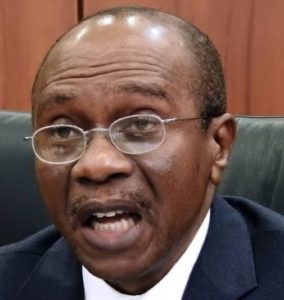Headlines
Experts call for interest rate reduction as inflation slows to 16 month low

FELIX OLOYEDE

Godwin Emefiele, CBN Governor
Economic experts have urged the Central Bank of Nigeria (CBN) to cut down interest rate as part of measures to successfully scale down the country’s domestic inflation rate.
Data released by National Bureau of Statistics (NBS) last week, showed that Nigeria’s inflation rate slowed for the eighth consecutive month to 15.98 percent in September from 16.01 percent in August, lowest level it has attained since May 2016. The country’s inflation reached a 12 year high of 18.72 per cent in January due to acute foreign exchange scarcity in the country, resulting significant drop in crude oil prices, which weakened the naira. But with the rebounding of crude oil prices, the country’s currency has been stable as the CBN has been able to inject dollar into Nigeria’s forex market and introduced the Nigerian Autonomous Foreign Exchange (NAFEX) window, which has made hard currencies more available to importers.
Dr Adi Bongo, an economist and faculty member, Lagos Business School argued that it would be very difficult to achieve single digit inflation rate with benchmark interest rate remaining as high as 14 per cent, which made the government to borrow at 18 per cent. The apex targets 6-9 per cent inflation rate for 2017, which the Economic Recovery and Growth Plan (ERGP) launched by the President Muhammedu Buhari administration earlier in the year aims to achieve single digit inflation rate by first quarter of next year. But Focus Economics Consensus Forecast panelists expect inflation to average 16.3 per cent in 2017 and 12.8 per cent in 2018, up 0.4 percentage points from last month’s forecast.
Bongo noted that the country’s inflation was trending downward because of the post-harvest season, which pushes food prices down, but attributed the 20.32 per cent rise in food prices from a year earlier, compared with 20.25 percent in Augustto the fallen value of the naira, which has encouraged neighbouring countries to import food stuff, especially grains from Nigeria, which caused prices to spike. But NBS explained that high food inflation was largely driven by the costs of potatoes, meat and oils and fats.
“It is post-harvest season, we will see a lot of food in the market; inflation will keep dropping. So, it is not because of what anybody has done or not done. It is a natural development,” he said. “The nominal interest rate is an indicator of the inflation rate. While the CBN is struggling to fight inflation the government is borrowing heavily for as high 17-18 per cent interest rate. If we are looking at inflation rate that is below interest rate, that won’t fly in the face of economic theory. If interest rate goes down, you will see inflation go down,” he further explained.
The data from Nigerian statistics agency indicated that prices of housing and utilities declined to 8.8 per cent year-on-year in September compared to 9.2 per cent in August; Clothing and footwear was 15.8 per cent, 0.1 percentage point lower than that of the previous month. Transport inflation rate was 12 per cent compared 11.8 per cent in August. And on monthly basis inflation rate increased 0.17 per cent in September.
Mr Victor Ukpai, market risk analyst, Stanbic IBTC Pension Managers Limited said in a telephone conversation that, “Presently, it is difficult for banks to advance loans to the real sector, so, our manufacturing companies are dying. And banks are afraid of exposing themselves to the agriculture sector too, because of fear of non-performing loans, which stifles growth in that sector. So, unless production capacity in the country rises through making credit available to the real sector, inflation will continue to be high.”
He projected that 15 per cent inflation rate for 2017, saying the country may achieve single digit inflation by second quarter of next year, though Shale oil still poses a threat to the rising price of crude oil.
Many developed economies are already concluding plans to face-off fossil fuel cars, which would affect crude oil demand in the international market.
Nigeria economy expanded 0.55 per cent for the first timein Q2 since slipping into recession in Q1 2016. And the International Monetary Fund estimated that the country’s economy would grow by 0.8 percent in 2017 and 1.9 percent next year.


